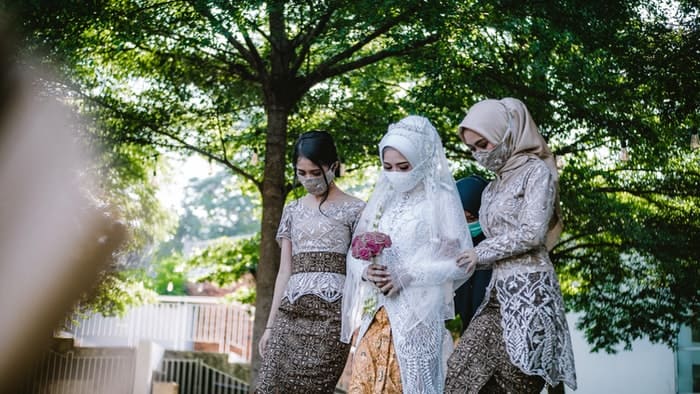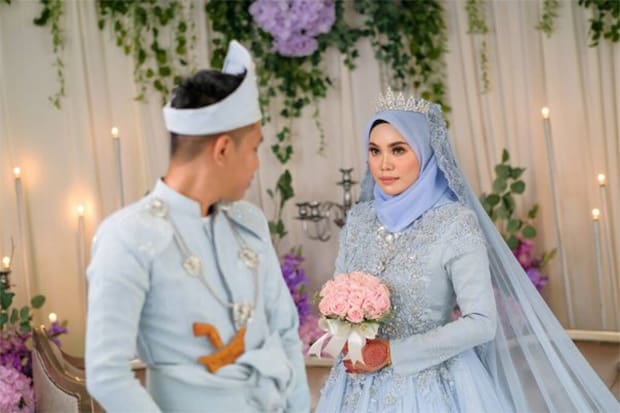Traditionally, the groom has been expected to pay for the Muslim wedding ceremony. However, with changing times, some couples are sharing the cost of the wedding. There are pros and cons to both approaches, and it ultimately comes down to what works best for the couple. Some couples feel that it is important for the groom to be responsible for all of the wedding costs, while others believe that sharing the burden is more fair. Ultimately, it is up to each couple to decide how they want to handle wedding expenses.

Tradition of Paying for A Muslim Wedding
When two Muslims decide to get married, there is often a lot of discussion about how the wedding will be paid for. Some couples opt for a simple ceremony, while others go all out with an extravagant affair. No matter what the budget is, one thing is for sure: the groom’s family always pays for the wedding.
Traditionally, it is the groom’s responsibility to provide everything needed for the wedding and to make sure his bride is comfortable and happy on her big day. This includes paying for the venue, food, drinks, decorations, and even the wedding dress. The bride’s family typically plays no role in funding or organizing the wedding.
There are a few reasons why this tradition exists. One theory is that it dates back to when men were considered the breadwinners of their families. In some cultures, the groom’s family provides everything for the wedding. The bride’s family merely attends the event and is not expected to provide anything in return.
Who Pays for Walima in a Muslim Wedding?
When a Muslim couple gets married, one of the first things that is done is the walima. This is a celebration party that is thrown for the couple by the groom’s family. There are many different ways to celebrate a walima, but one thing that is always included is food. The groom’s family pays for everything at the walima, from the food to the decorations. They also usually provide transportation for guests who need it.
Walima is the wedding feast that takes place after the Islamic wedding ceremony, nikah. The word walima is derived from the Arabic word wilaya, meaning “to eat.” Walima is an obligatory event and is considered one of the most important occasions in a Muslim’s life. It is a time to celebrate the marriage and enjoy a party with family and friends. The food served at walima is generally more lavish than at other meals, and may include dishes such as lamb, chicken, rice, and biryani.
How Much Does a Muslim Wedding Cost?
That is a question that doesn’t have a straightforward answer. The cost of a Muslim wedding can vary greatly, depending on a variety of factors. Some of the factors that can affect the cost include the location of the wedding, the number of guests, the type of ceremony and reception, and whether or not there is a theme.
One thing that is certain is that Muslim weddings are typically more expensive than traditional Western weddings. This is partly because they involve more intricate ceremonies and rituals, and partly because they often require more elaborate decorations and catering.
Generally speaking, it is safe to say that a Muslim wedding will cost anywhere from several thousand dollars to tens of thousands of dollars. So if you’re planning on having a Muslim wedding, be prepared to open your wallet wide!

How to Budget for A Muslim Wedding
When budgeting for a Muslim wedding, it is important to consider the religious and cultural traditions that will be observed. There are many expenses to consider, such as the cost of the venue, food, decorations, and clothing. Muslims often choose to have an all-inclusive wedding ceremony and reception, so it is important to budget accordingly.
Food
When it comes to weddings, food is one of the biggest expenses. For Muslim weddings, this is especially true because of the traditional feast that is served. The cost of feeding all of the guests can easily run into the thousands of dollars. This is a major reason why many couples choose to have smaller weddings with fewer guests.
There are some ways to offset the cost of feeding all those people, however. One is to have a buffet instead of serving individual meals. This will allow guests to serve themselves and will reduce the amount of food that needs to be prepared. Another option is to ask guests to bring a dish to share. This can not only help cut costs but also provides an opportunity for guests to show their culinary skills.
Decorations
When planning a Muslim wedding, there are many things to consider, including the cost of decorations. Some couples may choose to have a simple wedding with few decorations, while others may go all out and have a lavish affair. Regardless of what type of wedding is planned, the cost of decorations can add up quickly.
There are many ways to save money on decorations without sacrificing style. One option is to use natural materials such as flowers, leaves, and branches instead of buying expensive store-bought decorations. Another option is to make or buy simple DIY decorations instead of spending money on more elaborate options.
Clothing
When planning a Muslim wedding, one of the first things to consider is clothing. Unlike other weddings, where the bride’s gown and groom’s tuxedo are often the star of the show, Muslim couples must take into account their religious dress code when selecting outfits for the big day. While there is some flexibility, most Muslims adhere to specific guidelines when it comes to clothing.
For women, dressing modestly is key. This means covering up everything but the face and hands. Many brides choose floor-length gowns with long sleeves and high necks. There are many beautiful options available for Muslim brides, and choosing a gown that reflects your culture and personality is a great way to express yourself on your special day.
Grooms also have specific guidelines to follow when it comes to clothing. Men are expected to wear loose-fitting trousers, shirts and neckties. In keeping with Islamic teachings, men should avoid anything that is tight or revealing.
Conclusion
In conclusion, it is important to consider the cultural and religious traditions that come with a Muslim wedding. The groom has traditionally been expected to pay for the ceremony, and this should be taken into account when planning your big day. If you are having a Muslim wedding, be sure to consult with your Imam or religious leader to make sure you are following all the appropriate traditions.









